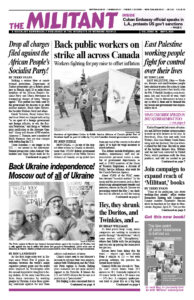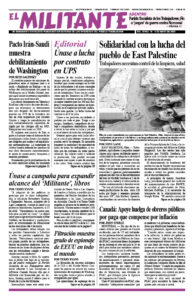PAJARO, Calif. — There has been an outpouring of solidarity for workers whose homes were flooded here when a levee broke March 11. Some 200 volunteers turned out April 15 to help flood victims clean up mud, rip out water drenched floors and carpets and rebuild home foundations. Members of area churches have contributed food and clothing. Community organizations and small-business people have been raising funds.
A week later members of the Socialist Workers Party visited an area in Pajaro set aside for those helping out and met some of the volunteers. Members of a San Jose Buddhist church in white hazmat suits were taking a break after spending the morning digging mud out from under houses and trailers. Students from the University of California in nearby Santa Cruz were there to join in. Translators had come to aid indigenous residents who speak Mixteco and Zapotec.
The solidarity shown by workers and others is in sharp contrast to the callous disregard shown by government agencies toward flood victims in this working-class community where many farmworkers live. For weeks after the flood almost no government aid arrived. Finally, on April 3, residents became eligible for loans and other help from the Federal Emergency Management Agency, but only if you had papers the government considers legitimate, and are able to navigate the bureaucratic obstacles involved.
Volunteer Lizbeth Garnica told us that hundreds of families are still in shelters or living with relatives because their homes are not livable. With fields still muddy from flooding, many farmworkers have no work and no income. Even if you can’t live in your apartment because it was flooded, she said, landlords are demanding rent.
Garnica, whose parents are farmworkers, said she supported the protest that workers organized in Pajaro March 30, demanding aid and equal treatment for undocumented workers. “It makes me emotional, because such a march should not have to happen,” she said. We told her the Socialist Workers Party campaigns for amnesty for undocumented immigrant workers in the U.S. We can win people to this, we said, because it’s in the interests of all workers.
We also talked with Lucia Haro, who was working with other family members to clean and repair her mother’s home. The levee that broke should have been fixed years ago, she said.
Government authorities have known since the 1960s about the need to repair the levee. But nothing was done because the federal Army Corps of Engineers bases its priorities on the value of the land involved. So levees in well-off areas get fixed, while the needs of working-class communities are put on the back burner.
Going door to door in Watsonville, we met Marilu Martinez, a house cleaner, who ticked off a list of class injustices that anger her — not only the flooding, but lack of good schools for their children, discriminatory treatment of immigrants and rising gas prices that make it more expensive for her husband’s long drive to work.
We showed her the Militant with the article on how people of East Palestine, Ohio, are fighting for control of the cleanup after the derailment there. Workers need to rely on ourselves, we said, to get organized and use our unions. We need to build a labor party to take political power out of the hands of the ruling rich. She signed up for a Militant subscription and wants to talk more, saying she liked what she heard, “100%.”
Several of the Red Cross volunteers we met in Pajaro were from Ohio. One was Atticus Flower, who said he was impressed with the response of the people of East Palestine to the train wreck there, their solidarity and role in getting things done.

